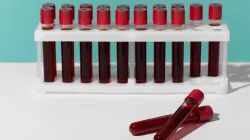Blood not for sale, only processing fee to be charged: DCGI tells blood banks
The Drug Controller General of India (DCGI) has recently made an important decision regarding blood donations and the functioning of blood banks in the country. To regulate and monitor the sale of blood, the DCGI has directed all blood banks to strictly adhere to the policy of not selling blood.

To curb the practice of overcharging, the top drug regulator has decided to eliminate all other costs, meaning that hospitals and blood banks can only now charge processing fees for blood.
In a communication to all states and UT drugs controllers cum licensing authorities, the Drugs Controller General of India (DCGI) stated that the decision was taken given the opinion that "blood is not for sale".
Referring to the 62nd meeting of the Drugs Consultative Committee held on September 26, 2023, the DCGI in the letter on December 26 said, "It was recommended with respect of agenda No. 18 of ATR point 3, for overcharging of blood, it was opined that blood is not for sale, it is only for supply and only processing cost may be charged by the blood centre."
The revised guidelines stipulate that only processing fees can be charged for blood or blood components which ranges between Rs 250 to 1,550 for blood or blood components.
The DCGI has asked states and UT drug controllers to direct all blood centres under their jurisdiction to adhere to the revised guidelines.
According to official sources, per unit of blood in case of no blood donation is priced between Rs 3,000 to Rs 8,000 by private hospitals. In cases of blood shortage or rare blood groups, the charges may go up higher.
This decision aims to prevent the commercialisation of blood and ensure that it remains a humanitarian act of donation. By eliminating the sale of blood, the DCGI hopes to promote voluntary and altruistic donations which are vital for meeting the increasing demand for blood in medical emergencies. This move will also ensure that patients receive safe and quality blood without any monetary transaction involved. Overall, this decision by the DCGI is a positive step towards promoting ethical practices in the healthcare system and ensuring that blood remains a precious gift of life that should not be traded for profit.
(With PTI Inputs)